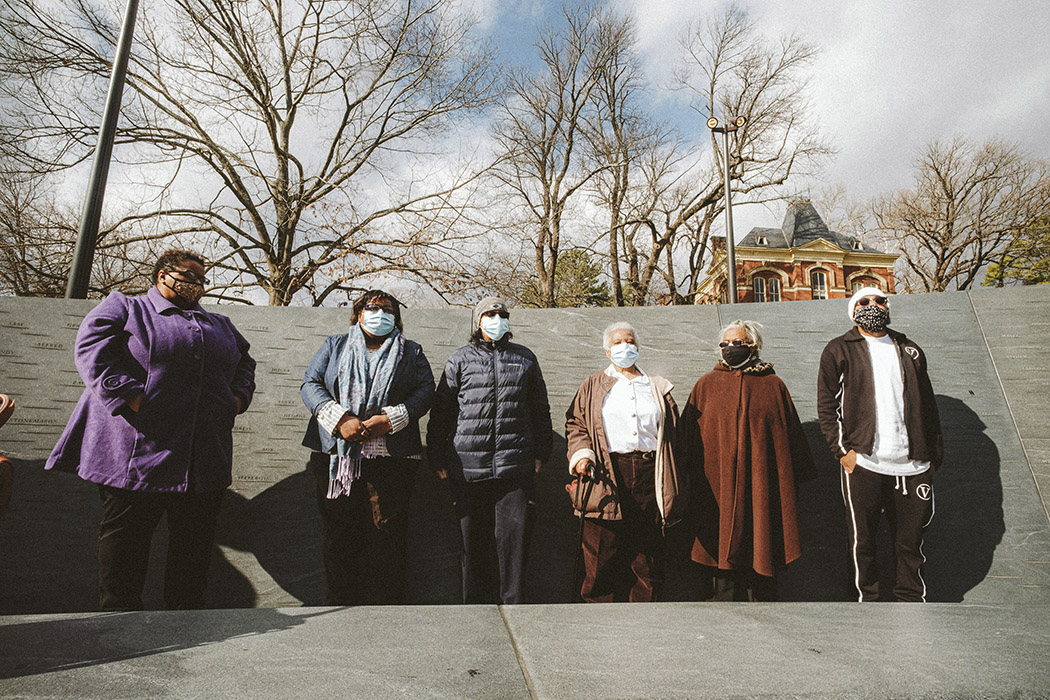For nearly a year, Isabella Gibbons has peered over Charlottesville. Inscribed into the rough-hewn granite of the University of Virginia’s Memorial to Enslaved Laborers, her eyes not only draw attention to the cruel realities of slavery—but ask what we are going to do to rectify them.
As UVA continues to atone for its racist history, a form of reparation may finally be on the way for the living descendants of enslaved laborers like Gibbons, who helped build and maintain the university for decades.
On February 5, the Virginia House of Delegates passed a bill that would require five state colleges established before 1865—the University of Virginia, Virginia Commonwealth University, Virginia Military Institute, Longwood University, and the College of William & Mary—to offer full four-year scholarships to descendants of enslaved laborers, allowing them to attend the school of their choice.
“When you think about the centuries of legacy admissions that have occurred, this is really just the bare minimum that could be done for a community of people who are responsible for these institutions existing,” says Justin Reid, manager of the General Assembly Virginia African American Cultural Resources Task Force.
“More than anything, this bill gives the General Assembly’s seal of approval for efforts that in many cases are already underway,” he adds. “There are institutions doing this work that wouldn’t be doing it if it had not been for student activism, faculty support, and descendant organizing.”
If the bill is passed by the state senate, the colleges will have to tap into their large endowments (or fundraise) to pay for the scholarship program, which would take effect in the 2022-2023 academic year. They will also be obligated to build a memorial to enslaved laborers, if they have not done so already.
At UVA, descendants have already established their own independent organization. Though the group is still getting organized, one of its main goals is to establish reparations scholarships.
“Our ancestors [not only] put their blood, sweat, and tears into creating and building the university,” says Bertha French, co-chair of Descendants of Enslaved Communities at UVA, “but their bodies were a part of a system of finance that were foundational to the beginnings of our country.”
In addition to providing free higher education—which is “a passport for upward mobility,” says French—to thousands of African Americans, these scholarships would rectify the ways in which the bodies of enslaved people were defiled and abused in the name of scholarship, she explains.
“People were robbing graves and taking cold bodies to use for research in medical schools, and to study anatomy,” French says.
For founding co-chair DeTeasa Gathers, the fight for descendant scholarships is personal. In 1963, her late mother graduated from UVA hospital’s segregated licensed practical nurse program—but was not allowed to attend the university.
“As she was passing, she told me not to forget her,” says Gathers. “Not forgetting her is also part of my push for this process.”
There are institutions doing this work that wouldn’t be doing it
Justin Reid, manager of the General Assembly Virginia African American Cultural Resources Task Force
if it had not been for student activism, faculty support, and descendant organizing.
Per the proposed law, the five colleges will be required to work with the State Council for Higher Education to identify as many of the enslaved people who worked on their campuses as possible, which will determine how many scholarships or grants each institution awards. For UVA, that number will range between 4,000 and 5,000.
One of the challenges of establishing programs like these is locating the descendants of enslaved people, which often must be done using incomplete or nonexistent historical records. Genealogist Shelley Murphy has already built over 100 family trees, and identified more than 45 descendants of people enslaved at UVA.
In 2019, “I began with doing presentations about the research and who I am looking for: descendants of the enslaved laborers, descendants of the slave owners, other genealogists, and family historians [who] have central Virginia ancestry connections,” she says. “I also use social media…The more that know about it, the chances increase in finding more descendants.”
Now that the Memorial to Enslaved Laborers has been open for almost a year, Murphy says she’s had a lot more people contact her directly about being a descendant. If their intake form shows a possible connection to the area, she meets with them over Zoom, and begins to dig into their family history.
Across the commonwealth, other colleges and universities have taken their own steps toward addressing their troubled pasts.
Since 2009, the Lemon Project—named after an enslaved man—has worked to uncover William & Mary’s deep ties to slavery, offering courses, symposiums, and other educational events. The college has also commissioned a $2 million memorial to enslaved laborers, which is set to be completed next year.
Other institutions are not as far along in the process. After facing scathing accusations of “relentless racism” by Black students and alumni, VMI removed its statue of Confederate General Stonewall Jackson last year. While the school’s policies and culture remain under third-party investigation, it has begun to research and identify the people it enslaved.
If the legislation is approved, Reid ultimately hopes it can be expanded upon to include even more colleges in the state.
“Virginia wouldn’t exist without the labor of enslaved people,” he says. “All of our higher ed institutions have benefited from this history.”
